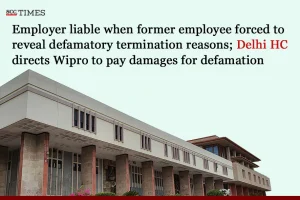Delhi High Court: In a suit to expunge certain defamatory remarks made in the termination letter issued to the petitioner by the respondent (Wipro), the Single Judge Bench of Purushaindra Kumar Kaurav, J, opined that the employer cannot escape liability for foreseeable instance of compelled disclosure of defamatory reasons for termination of employment to prospective employers. Therefore, the Court held Wipro liable for civil defamation, ordered removal of the impugned defamatory remarks in the termination letter and granted Rs 2 lakhs as damages to former employee.
Background
The petitioner was employed with Wipro from 2018 to 2020 and his employment was governed by an employment contract which, through its Clause 10, allowed either party to terminate the employment by serving the requisite notice period of 1 month during probation and 2 months after confirmation. Wipro had issued a termination letter on 5-6-2020 which attributed the conduct of the plaintiff as ‘malicious’ and stated that there had been a ‘complete loss of trust’ leading to an irreparable breakdown of employer-employee relationship.
The petitioner had alleged that the usage of such aforementioned terms was defamatory to his character and professional integrity and therefore sought to get them expunged from the termination letter. The petitioner had contended that such adverse remarks in the termination letter had a detrimental impact on his professional reputation and have rendered him unable to secure any alternative employment.
Per contra, Wipro had contended that the petitioner had failed to establish that the offending statements had been published, broadcasted or transmitted to persons other than the petitioner. Wipro had further contended that the petitioner was more engaged in his self-styled identity as a ‘Crusader for Social Change’, than his professional duties. Wipro also submitted that the petitioner was given repeated chances to improve his performance through a Performance Improvement Plan, however the petitioner had shown no interest in improving his professional performance which ultimately led to his termination from employment.
Analysis, Law and Decision
The Court analysed the instant factual matrix in light of the essential constituents of civil defamation and decided on three issues which were:
1. Whether the allegedly defamatory remarks are false and defamatory, and is there an absence if a valid defence?
The Court observed that the petitioner had placed on record several performance evaluation reports which rated the petitioner as a high performer and as making a ‘highly valuable contribution’. Various internal emails, performance appraisals and assessments described the petitioner as a competent and professional individual, an assessment which was in stark contrast to the allegations made in the termination letter. The Court held that the remarks made in the termination letter were demonstrably false and defamatory in nature. In absence of any valid defence presented by Wipro, the threshold for falsity and absence of valid defence stood fulfilled.
2. Whether the defamatory remarks are identifiably referring to the plaintiff?
The Court noted that since the termination letter was issued in the name of the petitioner, there was no ambiguity regarding the identification and therefore the requirement of a specific and discernible reference stood satisfied.
3. Whether the defendant published the defamatory?
The Court relied on evolving American jurisprudence to note that the doctrine of compelled self-publication, which was a logical emanation of the foreseeability principle, propounded that any originator of defamatory statement, whose conduct predictably forced another, to disclose a defamatory matter, must answer for its spread. The Court further noted that cases of employer-employee libel rested on a dual inquiry:
- did the defendant have actual knowledge that third-party access was probable; or
-
would a reasonable person, similarly circumstanced, have anticipated or foreseen that such access would occur.
The Court noted that the assertions made in the termination letter were bound to surface in the course of future employment. It was a matter of common knowledge and ordinary prudence that in matters such as job applications, background verification, or reference checks, the petitioner would be left with no option but to disclose the impugned termination letter to prospective employers. The Court further noted that Wipro, being an employer itself, was, in all probability, aware of the fact that prospective employers would want to inquire about the antecedents of the petitioner. Such disclosure, being a foreseeable and natural consequence of incorporating the defamatory remarks in the impugned termination letter, rendered the act actionable in law.
Hence, the Court held that the impugned termination letter, replete with stigmatic language and bereft of any foundation, constituted actionable defamation. The use of the term ‘malicious conduct’ not only lacked substantiation, but also had a direct and detrimental impact on the future employability and professional dignity of the petitioner. The Court noted that the absence of any legitimate defence advanced by the defendant and the tortious injury suffered by the plaintiff warranted an intervention.
Therefore, the Court deemed it fit to award Rs 2 lakhs as general compensatory damages to the petitioner to redress the reputational harm, emotional hardship, and loss of professional credibility caused by the conduct of the defendant.
The Court further directed that the remarks with respect to the professional character of the petitioner be expunged from the termination letter. Furthermore, a fresh termination letter was directed to be issued by Wipro, devoid of any defamatory content.
[Abhijit Mishra v. Wipro Ltd., 2025 SCC OnLine Del 4976, decided on 14-7-2025]
Advocates who appeared in this case :
For the Respondent: Mandeep Singh Vinaik, Ragini Vinaik, Gaikhuanlung , Advocates

